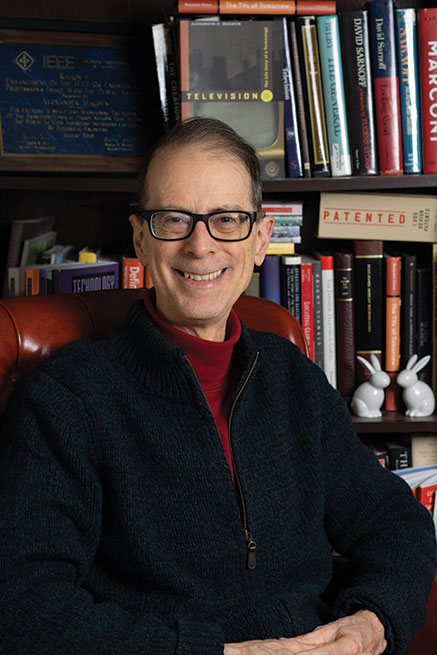
DEGREES: B.A. in history; M.A. in history (British external policy), University of East Anglia, U.K.; Ph.D. in U.S. history, University of Maryland
JOB TITLE: Outreach historian, IEEE History Center
FAVOITE TRINITY MEMORY: Having my mind blown after going reluctantly to The Rocky Horror Picture Show at Cinestudio, only after my roommate, the late Harrison “Brick” Fisher ’81, offered to pay for my $1.50 ticket.
What do you do in your role as an outreach historian? I edit and write for historical sections of two IEEE publications, prepare exhibits, chair a group of historians of communications technologies, organize sessions and present research at international conferences, review grants and analyze project proposals, and write if I’ve finished everything else. Electrical history is a niche field that receives no attention in history curricula, but the technologies involved and the inventors, entrepreneurs, and consumers responsible for them interact with politics, economics, and society at local, national, and global levels in important and consequential ways.
The IEEE website calls you an “expert in the history of television.” What makes that subject so interesting to you? In the story arc of innovation from concept to commercialization to obsolescence, television has the usual cast of ambitious, idealistic, smart, and pragmatic inventors and entrepreneurs who compete for achievement, wealth, and credit. I stumbled onto it during my dissertation research by discovering that the David Sarnoff Library in Princeton, New Jersey, had a basement. It was full of notebooks of the researchers who invented the monochrome and color TV systems adopted and adapted by the world. I grew up with minimal awareness of the Radio Corporation of America (RCA), and I watched practically nothing in the 1980s but movies at Cinestudio, so my interest in TV was as small as the screen. But here was Sarnoff, who invested in the technical staff to realize his vision of instantaneous communication of sight and sound for everyone. He anticipated the smartphone in the early 1960s, and we still use the CMOS circuitry, LCDs, and blue LEDs that RCA researchers pioneered. An editor from Greenwood Press asked if I would write a history of sound recording and reproduction for its new book series. Expecting to revise my dissertation on the phonograph record for another press, I recommended another historian and offered to do television instead. No one had synthesized the whole story in a readable fashion.
You have appeared twice on the History Channel for your expertise in the history of TV. What was that like? Once you have a book, you’re an expert. Lessons learned: speaking in complete sentences without too many filler words makes you sound authoritative. If you think you’re going to change the director’s approach to the subject that you know a lot more about, you’re not.
How did your time at Trinity prepare you for what you do now? On the meta level, it affirmed that I wasn’t going to dedicate my life to someone else’s profits, as essential as that is in our political economy, and that I would work best in small groups committed to excellence. In particular, Cinestudio demonstrated that you can cultivate appreciative audiences for great, varied content with appropriate planning, publicity, and first-class presentation. The commitment of the founders—Larry Stires, James Hanley ’72, H’20, and Peter McMorris ’73, H’20—continues to inspire me. As for my career, there are the usual suspects: a liberal arts curriculum that included calculus and chemistry, lots of writing, and an appreciation for a well-crafted lecture. Raconteur George Cooper and Jay West come to mind. Trinity also sharpened my historical bent unintentionally. Ted Sloan’s freshman seminar, “Fiction, Film, and History,” was not my first choice, but comparing those genres has only become more important with the explosion of video.
You have said that you weren’t very happy at Trinity. How did you cope? If you’re alienated on campus and you don’t want to transfer, there are supportive niches as well as identity groups: serious scholarship, WRTC, the Tripod, Austin Arts, athletics. For me, selling tickets at Cinestudio once a week enabled up to four free movies, so I fell into what amounted to a three-year internship in film exhibition. The other escape was geographic: junior spring at the University of East Anglia. Taking two seminars each term was intellectually liberating.
You worked and volunteered at Trinity for several years after graduation. Why did you stay connected? Given how unhappy I was in college, it is ironic that I stayed on campus for another seven years. But my best friends were at Cinestudio, and after setting records in cross country and outdoor track, I wanted to share the training expertise I gained at UEA with Trinity’s distance runners. I taught human relations at Hartford State Technical College thanks to James Hanley; taught history at Watkinson School under headmaster Charlie Todd ’64 thanks to his classmate, history professor Jack Chatfield ’64; waited tables at John Chapin ’70’s pioneering new American diner, Shenanigans; and deejayed for Ron Cretaro ’71’s nonprofits. Hartford’s a terrific city because it has such cultural diversity within a fairly small population and an attractive area, interstates notwithstanding.
